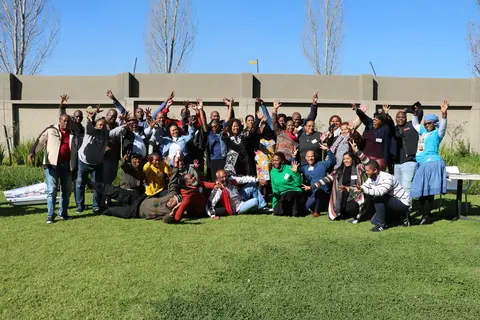SA youth struggling to develop positive money values due to poverty
ApartheidAt first glance the township of Siyabuswa in Mpumalanga seems fairly quiet. The empty streets suggest that learners are at school and adults are at work.
But, as you turn the corner of Haig road and approach Nkangala FET College, C N Mahlangu Campus, a crowd of residents and students gather by the college gates, chanting old anthems from the apartheid struggle, calling for political change and freedom.
We’re here to deliver what we believe would be an impactful lecture on our Heartlines Money Values campaign to encourage young people to have greater awareness of their spending habits and develop a positive attitude towards money. These plans have now been put on hold.
These young people want to have a conversation about money, but it’s about the financial challenges they face trying to acquire a higher education and feeling like they are not being equipped to become equal participants in South Africa’s economy.
The money talk
Student leader, Tebogo Phokungwane, emerges from the crowd of protesting students to chat to us, wearing a bright yellow and red T-shirt with the insignia of the South African Student Congress.
“All of the students at our college depend on government funding for their education, many come from homes where parents are unemployed and others have their own children already so the money they receive from NSFAS is the only income their families have to survive,” he says.
Tebogo believes it is these challenging circumstances that affect young people’s relationship with money.
“Our education system does not support us adequately financially, and it does not teach us about saving money or creating wealth. When we receive money we don’t think about investing, we think about survival, and utilise it to solve the problems we face daily.”
In 2015 research conducted by Student Brands found entertainment, clothing, education, accommodation and travel to be the six most common spending categories of South African students.
The 5th Annual Student Report conducted by Student Village In 2017 revealed that black students spent most of their money on takeaway and cosmetics, coloured students spent most on clothes and jewelry and white students spent it on groceries and alcohol.
Tebogo sheds some light on the matter.
“When we get to college we finally have freedom and independence. Personally, when I get money I use it for entertainment, clothing, cosmetics and save for transport and other day-to-day needs.
When I am older, I want to have a completely different relationship with money. I want to be able to start a business, save and invest for the future and have enough money to take care of myself and my family,” he says.
Pressure to succeed
1st year civil engineering student Raymond Molekoa says students who come from poor homes are under pressure to become breadwinners.
“My parents are not working and I’m expected to excel in college so I can find work and provide for my family. When I get money I spend it on food and alcohol, hanging out with my friends helps me forget about my problems,” he says. “I wish I could have more money to live a more comfortable lifestyle.”
Like Tebogo, Raymond believes not enough is being done in schools to educate young people about money.
“Right now, it’s about studying and looking for a job. We are not being taught about entrepreneurship so that we can start businesses and create employment opportunities, which will tackle the issue of unemployment and poverty,” he adds.
According to the Young Women’s Trust, young people between the ages of 16-30 battle to make it to the end of the month without borrowing money from friends, family or commercial lenders, and anxiety stems from knowing they should be saving and investing, but they are unable to due to a lack of information and a lack of funds.
Stress & Anxiety
Young people also have financial stress as a result of paying off student loans, “black tax” and daily financial pressures adds to anxiety with young working people feeling the pressure to succeed while living pay-cheque to pay-cheque.
It’s become increasingly apparent that some young people will struggle to develop and uphold good money values, in light of the challenges they face due to poverty and financial pressure. Added to that is the youth unemployment rate, with over 50% of young South Africans struggling to find work.
At least if we can provide young people with information on how to make better decisions about money, in order for them to achieve financial freedom and achieve their goals, we could possibly start to deal with the issue of poverty and break the cycle that keeps young people financially unstable as a result of debt, family responsibilities and pressure to succeed.
Featured



